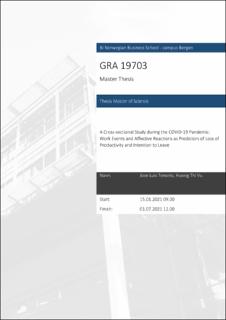| dc.description.abstract | This study applied the Affective Events Theory in which the relationship between work events and
affective reactions are examined and how this relationship influences job performance and
organizational commitment. We aim to explore and analyze how work events (home office, job
insecurity, LMX leadership, social support, and job autonomy) and affective events (COVID-19
optimism, burnout, and loneliness) might influence work attitude (employee engagement), job
performance and intention to leave of employees during the COVID-19 pandemic. A sample of
152 respondents was obtained, mainly distributed in Norway from different industries, namely,
media, seafood, finance, ocean technology, academic institutions. The findings show that job
autonomy, burnout, and loneliness contribute to predicting a loss of productivity; job insecurity,
burnout, and employee engagement are predictors for intention to leave. Notably, burnout
significantly predicts intention to leave (p< .001) and loss of productivity (p< .01). Even though
we did not find the interaction effects among variables, LMX leadership appears to be strongly
linked with the rest of the variables in terms of direct effects. LMX leadership might play a pivotal
role to either prevent or react to the loss of productivity and intention to leave. Working from home
during COVID-19 times has been a trendy topic, mainly because it promotes a new way of
working. But interestingly, we discover that the home office does not have any influence over the
intention to leave and job performance.
Keywords:
Intention to leave, job performance, LMX, employee engagement, COVID-19, job insecurity,
burnout, home office, job autonomy, loneliness. | en_US |
